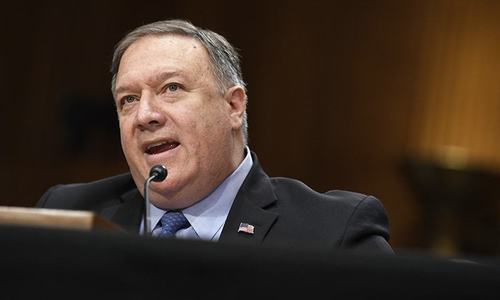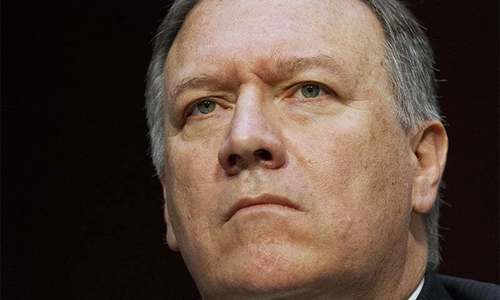One year after President Donald Trump bolted from the Iran nuclear deal, the United States is ratcheting up pressure on Tehran nearly by the day, from expanding sanctions to deploying B-52 bombers.
But even if the US campaign has succeeded in causing economic suffering in Iran, the broader objectives remain vague, with no clear end-game on how to wind down tensions that have raised fears of war.
Iran ─ which for the past year has made a point of steadfastly complying with the multinational nuclear accord negotiated under then president Barack Obama ─ on Wednesday's anniversary said it would stop observing some limits set by the deal.
Voicing frustration, President Hassan Rouhani appealed to European powers ─ which still back the agreement ─ to do more to allow trade so Iran feels the benefits of the agreement.
The Trump administration has relentlessly pursued a campaign of "maximum pressure", on Wednesday vowing to stop all of Iran's steel and mineral exports ─ after already threatening to punish any country that buys its top product, oil.
'Escalation for the sake of escalation'
In recent days, the United States has also announced the deployment of an aircraft carrier strike group and the nuclear-capable B-52 bombers to the region, warning of a response to what it alleges is an "imminent" threat from Iran ─ a claim met by scepticism in numerous quarters, with leading US Democratic lawmakers fearing that President Donald Trump's administration is seeking to spark a war with Iran.
Senator Chris Murphy, a Democrat, called Trump's policy an "unmitigated disaster" that has goaded Iran into resuming a nuclear program that it had stopped.
"Trump's Iran strategy is blind escalation. There is no end-game. No overriding strategy. No way out," Murphy tweeted.
"It's just escalation for the sake of escalation. That's wildly dangerous and inexcusably dumb, in that order," he said.
'Method to the madness'?
Secretary of State Mike Pompeo says that the pressure campaign has achieved "significant successes" and has repeatedly pointed to the financial woes of Hezbollah.
Pompeo in May 2018 laid out 12 demands that virtually no Iran watchers believe the clerical regime will meet, including a complete scaling back of its regional role and alleged support of militias that often clash with US allies, Saudi Arabia and Israel.
Suzanne Maloney, deputy director for foreign policy at the Brookings Institution, played down the risks of war, saying that the Trump administration understood the dangers of a full-fledged conflict with Iran.
"What the administration does want is for Iran to be under maximum pressure for a sustained period of time in order to minimise or even reverse its advantages across the region," Maloney said.
She said that US officials believed from past experience that Iran "doesn't bend under a small amount of pressure" but could change if faced with severe threats. "I think there is a method to the madness," she said.
But she doubted Iran would bow to demands to withdraw itself from the region.
"I don't think they will pull back because if they did, the administration would read that as a signal that its approach is working and it would only double-down," she said.
Nuclear deal withers
Some experts believe that the United States may in fact welcome an unravelling of the nuclear accord, which would no longer give Iran the moral high ground of complying with it.
"If the administration is willing to take the risk of the nuclear deal completely collapsing, then their policies to date are moving us in that direction," said Dalia Dassa Kaye, director of the Center for Middle East Public Policy at the Rand Corporation.
An Iranian withdrawal would help the administration build support for a more confrontational approach, she said.
"The question is still, to what end?" she said.
"Some may hope for a regime collapse, but the Europeans ─ and certainly not the Russians or Chinese ─ will not support that objective," she said, adding that there remained "a lot of confusion" over US objectives.
Trump, who threatened to destroy North Korea before meeting its leader Kim Jong Un in two landmark summits, on Wednesday said that he hoped "someday" to negotiate face-to-face with Iran's leaders.
But few see a willingness to meet the hawkish president from Iran's leaders, for whom hostility toward the United States is a bedrock principle of the 1979 Islamic Revolution that toppled the pro-Western shah.
Instead, Iranian officials may be waiting for next year to see if Trump is re-elected, with the Democrats seeking to unseat him broadly supporting the nuclear accord.
But Quentin Lopinot, a visiting fellow at the Center for Strategic and International Studies, said an expected showdown could come much sooner.
"The question is the breaking point. When will the Iranians stop sticking to a point-by-point response?" he said.
In Iran's announcement, it gave European powers 60 days to fulfil commitments on sanctions relief -- a hard sell for European businesses that fear punishment in the United States.
"Until now the Iranians seemed to want to buy time, but this ultimatum risks bringing forward an escalation," Lopinot said.
















































